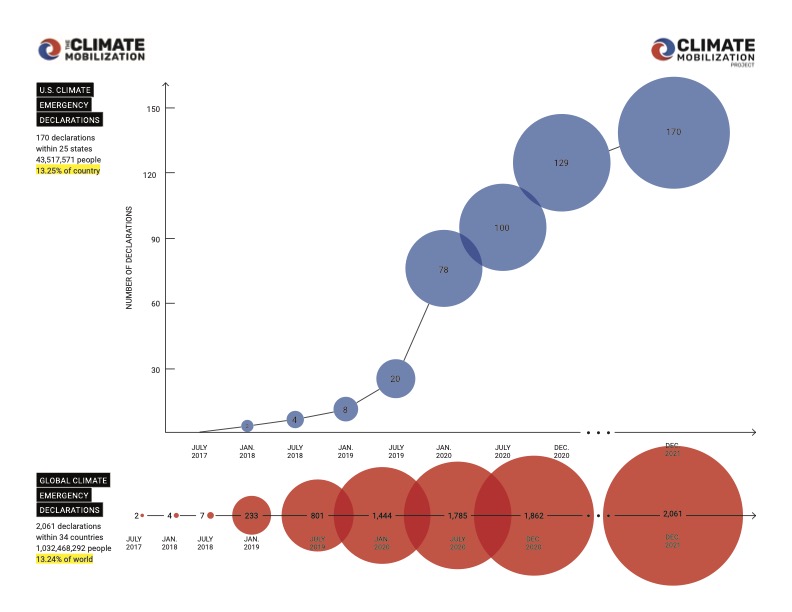Climate Emergency Declarations
New analysis demonstrates that the COVID-19 emergency is rooted within the larger context of global trends of ecological destruction, habitat loss, and warming temperatures.
Despite the many hardships brought on by the COVID-19 pandemic, organizers continue to push for declarations of Climate Emergency and policies that will create a just, rapid transition to address the Climate Emergency. To date there have been 1,493 declarations of Climate Emergency worldwide within 30 countries. The global population living in a jurisdiction that has declared Climate Emergency is 829,280,700 people, with the most recent declaration coming from Glen Eira City Council, VIC, Australia (May 5th, 2020).
New opportunities for organizing and resisting continue to evolve, as fossil fuel companies jockey for government bailouts, and frontline communities, some already more vulnerable to coronavirus due to negative health effects of pollution and economic inequality, face descrimination and police brutality in the era of social distancing.
Climate and COVID-19
Academics and journalists are exploring the rapid social and political changes brought on by global pandemic. In the midst of multiple planetary emergencies, it is clear that we cannot go back to “normal”, but must find a way to go “beyond” normal to reverse global warming and ecological crises to protect all life on our planet.
In a positive turn toward sustainability in the midst of crisis, cities like Seattle and Milan are exploring how to use the transition out of the COVID-19 crisis to make green improvements to transit. In Brussels, officials are expanding bike lanes and lowering speed limits for cars to encourage biking and walking. In Pakistan, workers laid off during the pandemic are being hired by the government to plant trees.
Extreme Heat
The Climate Emergency is already pushing ambient temperatures beyond the limits of the human body’s tolerance during certain times of the year. A new study finds that extreme heat events have arrived earlier than feared, with the frequency of “wet bulb” temperatures exceeding between 27°C and 35°C having doubled since 1979. The regions most impacted include the Middle East, Southeast Asia, and the Southeast United States.
Climate Psychology
Executive Director Margaret Klein Salamon continues to speak in the media about our new book Facing the Climate Emergency: The Transformative Power of Climate Truth. Margaret appeared on the Changemakers Podcast this week to discuss the book, emergency mode, and building a movement for transformational change. She is also featured in an interview with The Good Grief Network podcast around turning painful feelings into activism and igniting our personal call to action.
Long reads
In a reminder of the emergency nature of the situation, the New Republic explores climate anxiety and compares it with the very real and immediate physical threat the Climate Emergency poses to so many around the globe: Your Climate Anxiety Is Another Person’s Existential Crisis.
The Thomson Reuters Foundation News highlights an international call for bold changes in energy policy to revive the economy after the pandemic and equitably transition the world away from fossil fuels towards renewable energy: It’s time for a fossil fuel non-proliferation treaty.

















